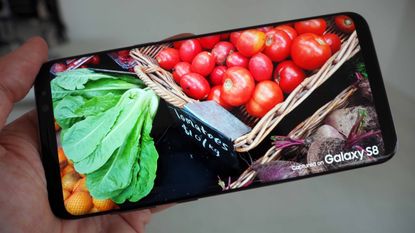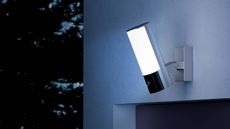It's that time of year again: Samsung has a new flagship to take on Apple's all-conquering iPhone.
The 5.8-inch Quad HD + 2960 x 1440 Gorilla Glass 5 display clocks in at a whopping 570ppi – comparable to last year’s S7 - and is significantly bigger than the 5.1-inch S7, 5.5-inch S7 Plus and iPhone 7 Plus. The S8 is clearly the best Galaxy ever made, and it beats the iPhone in several key areas. Let's discover how they compare.
Samsung Galaxy S8 vs iPhone 7 comparison: design and build quality
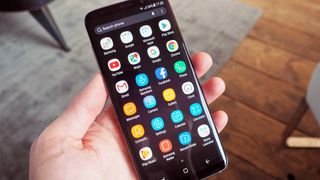
The Samsung Galaxy S8 is stunning, with hardly any bezel: the 5.8-inch Quad HD+ display takes up almost all of the front, and it looks great in the launch colours of Midnight Black, Orchid Gray and Arctic Silver. Leaked images suggest a blue special edition will turn up soon too.
The aspect ratio of the screen has changed to fit the edge to edge display: it’s now 18.5:9 compared to the previous Galaxy’s 16:9 ratio. The S8 is 148.9 x 68.1 x 8mm and weighs 155g. As with previous Galaxies it’s water resistant and dust resistant, something Samsung has managed to do without scrapping the headphone port.
You know the iPhone well enough by now: it’s clearly related to the very first iPhone, albeit bigger, slimmer and more powerful, and it comes in two shades of black, gold, rose gold, silver and a Product Red edition. It’s beautifully made, and since Apple removed the headphone jack it’s water and dust resistant. The iPhone 7 dimensions are 138.3 x 67.1 x 7.1mm and it weighs 138g.
Samsung Galaxy S8 vs iPhone 7 comparison: display
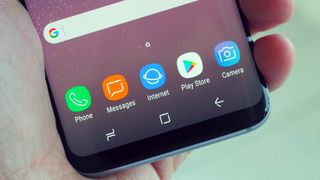
Samsung says the Galaxy S8 is the first Mobile HDR Premium handset, which suggests it’s forgotten about the LG G6, but while it might not be the first it’s still absolutely stunning. The 5.8-inch Infinity Display delivers 2,960 x 1,440 pixels, more than twice the pixels of the iPhone, and the pixel density is a whopping 570ppi.
The iPhone has a 4.7” retina HD display, which delivers 1334 x 750 pixels at a resolution of 326ppi. The contrast ratio is 1400:1 and it’s without a doubt the best display ever shipped in an iPhone, but it isn’t as exciting as the AMOLEDs that Samsung puts in its Galaxies.
Samsung Galaxy S8 vs iPhone 7 comparison: processor and storage
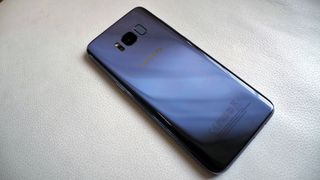
As ever, the Samsung Galaxy S8 comes in various flavours. The headline processor is a 64-bit 10nm Octa-core 2.3GHz Quad, but some markets will get the Snapdragon 635 or Samsung Exynos processor. There’s 4GB of RAM and 64GB of on-board memory, expandable via microSD cards.
The iPhone has Apple’s latest A-series processor, the A10 Fusion with an embedded motion coprocessor and 6-core GPU. It’s a quad-core processor with two high performance cores and two energy efficient cores, although unlike other multi-core processors such as Snapdragons or Exyonos only one kind of core can be active at any given time. That means the A10 appears as a dual-core processor in any benchmarks.
The iPhone 7 has three storage tiers: 32GB, 128GB and 256GB. There’s no option to add additional storage via microSD cards.
Samsung Galaxy S8 vs iPhone 7 comparison: camera
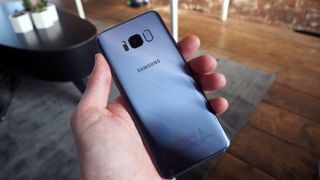
The Galaxy S7 had a great camera, and so does the S8: it's a 12.7MP Dual Pixel camera with an impressive f/1.7 aperture for excellent low light performance, and the front facing camera is also f/1.7, this time with 8MP and Smart Autofocus.
The iPhone 7 gets Apple’s second-best camera: unlike the iPhone 7 Plus it doesn’t get a dual-lens system with wide angle and telephoto lenses. It’s a 12MP sensor with f/1.8 aperture and 5x digital zoom, optical image stabilisation, quad-LED flash, Live Photos and HDR. It can record 4K video at 30fps, 1080p HD at up to 60fps, slo-mo at 120fps/240fps and offers both optical stabilisation and continuous autofocus while recording. The front camera is a 7MP, 1080p HD camera with an f/2.2 aperture and image stabilisation.
Samsung Galaxy S8 vs iPhone 7 comparison: battery and charging
Samsung has offered wireless charging and fast charging for some time, and the Galaxy S8 continues the trend. The battery is a hefty 3,000mAh. The iPhone doesn’t have fast charging - it takes about an hour and a half to fully charge -or wireless charging, and its 1,950mAh battery delivers a claimed 12 hours on 3G, 12 hours on 4G LTE and 14 hours on Wi-Fi.
Samsung Galaxy S8 vs iPhone 7 comparison: digital assistants
The Galaxy S8 has Bixby, its very own personal digital assistant, which uses technology created by the same people who originally built Apple’s Siri. There will be a dedicated Bixby button that brings it up, and it will use natural language processing and contextual awareness to do exactly what you want in the current app.
Samsung says you’ll be able to pull up specific photographs, scan and recognise printed text, search based on camera input, make payments and control appliances. There will be an SDK for app developers to include Bixby in their apps. It sounds amazing in theory, but we can’t rate Bixby until we’ve had the change to use it properly in our day-to-day activities. Bixby will initially be available in US English only; the UK English launch is later this year.
The iPhone has Siri, which can answer questions, search the web, read out messages, listen to and identify songs and control HomeKit devices. It’s getting better with each iOS release but it only became available to third party app developers in mid-2016, and even then only to certain kinds of apps such as taxi booking, payment apps and messaging apps.
Samsung Galaxy S8 vs iPhone 7 comparison: other key features
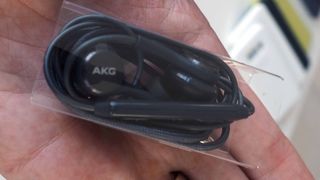
The Galaxy S8 benefits from a host of other improvements. Iris scanning is better, the Wi-Fi is now gigabit and the earbuds are made by AKG, the result of Samsung’s acquisition of Harman. The connector is USB-C, and there’s a new version of the Gear VR to fit the S8 with backwards compatibility for the S6 and S7.
There’s also DeX, a dock that enables you to use the S8 as a desktop computer in much the same way that Windows Phone can become a desktop. The S8 can also run two Bluetooth audio streams simultaneously to deliver multi-room audio. That’s clever.
Samsung Galaxy S8 vs iPhone 7: price and availability
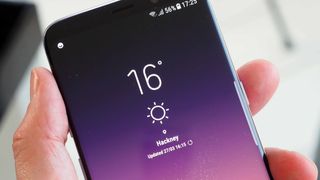
The UK price for the Galaxy S8 will be £689. Pre-orders open on 29 March and close on the 19th of April from Samsung.com/uk, and the official launch day is 28 April in the UK and Europe. To begin with the UK will get the Midnight Black and Orchid Grey models, with Arctic Silver possibly coming along later.
The iPhone 7 is widely available and starts at £599 for 32GB, rising to £699 for 128GB and £799 for 256GB.
Samsung Galaxy S8 vs iPhone 7 comparison: early verdict
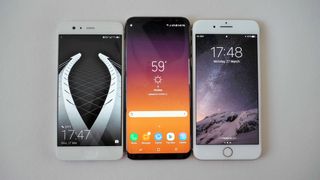
Let’s leave the OS allegiances to one side: by almost every metric, the Samsung Galaxy S8 is a better phone than the iPhone 7. It devotes almost all of its front to that screen, which would be stunning even if it were strapped to a house brick. It’s got a bigger screen, faster processor, bigger battery, waterproofing that doesn’t sacrifice a headphone port, expandable storage, a great camera, wireless charging and fast charging. Samsung’s design teams have made the clunky handsets of old a distant memory, and the S8 is a genuinely good-looking phone.
Does that mean iPhone owners should switch? Probably not: chances are they’ve bought not just the phone, but Apple’s ecosystem of other devices, apps and services such as Apple Music (which you can get on Android) and iCloud Drive (which you can’t). And of course, the iPhone 8 is due in a few months, with rumours suggesting a dramatic rethink of the entire device. But if you’re not wedded to Apple’s ecosystem, the S8 is singing a siren song.
